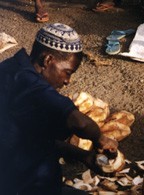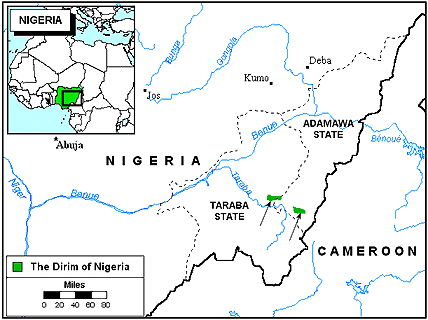The Dirim, also known as the Dakka, are located in the Adamawa, Mambilla, and Muri divisions of Gongola state, Nigeria, near Cameroon. They speak Dirim, one of the Niger-Congo languages. Many regard the Dirim as an offshoot of the larger Chamba group, with whom they share many similarities.
According to Chamba history, the Bata drove them from their original hometown in Lamurde Jongum to Chamba, a town at the base of the Alantika Hills. From there, the Chamba were once again driven out by the Bata, who forced them to the hills south of Chamba. From that point, the Chamba split into two groups, assimilating into areas inhabited by other tribes. One group became known as the Chamba of Donga due to the region into which they moved. The other group became known as the Dirim as a result of intermarriage and cultural influence from the Dirim tribe. The native Dirim so intermingled with the Chamba that the two groups are now considered one.
During the eighteenth and nineteenth centuries, the Fulani enslaved many of them. The British and French replaced the Fulani as overlords.
The Chamba Dirim are farmers, growing such crops as millet, sorghum, onions, maize and sweet potatoes. They practice crop rotation and sometimes leave the land fallow. Many of the Dirim also possess a few cattle, which are valued for their ability to fertilize the land. Most also keep goats, sheep, dogs and chickens. Men hunt, tend to the livestock, and do most of the fishing. The women help the men with the agricultural work and also perform domestic duties, which include preparing the meals and caring for the children. In addition to agriculture, they sculpt, make ceramics and do metal working.
Dirim villages are compact and surrounded by walls or hedges for protection. Within the villages are groups of enclosed family compounds, each containing several huts. Individual huts are round with mud walls and have cone-shaped, thatch roofs. Each village is led by a headman, whose office is hereditary. He settles disputes within the village and oversees village ceremonies.
The Dirim differ from other groups in their area in that their clans are matrilineal, tracing ancestry through the females. In addition, their clans are exogamous, meaning that they are free to marry outside their own clans. To the Dirim, it is taboo to marry someone from their mother's clan. Also unique to the Dirim is their practice of having monogamous marriages (one spouse), as compared to most other tribes in Africa, which commonly have two or more spouses. Adultery and divorce are rare among the Dirim, since the women live under close supervision with little opportunity to commit adultery.
A young man who desires to marry a certain girl gives her a ring and a bracelet, which she shows to her mother. The mother then discusses the eligibility of the suitor with her husband and brother. If they agree on the suitor, the girl is allowed to wear the jewelry that the young man gave her. When the girl reaches puberty, the young man moves into the compound of the girl's family and begins building a hut for her. Upon completion of the hut, the couple begins to live together as husband and wife.
Although some of the Dirim have converted to Islam due to Muslim Fulani influence, the majority still practice their traditional ethnic religion. They believe in a creator sun deity who interacts with the living through the ancestors who live underground. They have diviners whom they believe know the future, communicate with spirits, understand supernatural truths and explain omens. They perform religious rites in honor of deceased ancestors and family members of the deceased.
There are Christ followers among the Chamba Dirim who have the capacity to be Christ's ambassadors among their people.
The Dirim have access to few Christian resources. There is a great need for a full Bible translation and Bible resources to be translated and then distributed among them. The Dirim would also greatly benefit from Christian radio broadcasts in their language.
Pray that God will use the Dirim believers to share the love of Jesus with their own people.
Ask the Lord to bring forth a growing Dirim church that will plant more churches.
Pray for Chamba Dirim family leaders to have the spiritual discernment to lead their families to Christ.
Pray for visions and dreams of Christ that will open these people to believing in Jesus.
Scripture Prayers for the Chamba Dirim in Nigeria.
https://www.101lasttribes.com/tribes/chamba.html
| Profile Source: Joshua Project |











